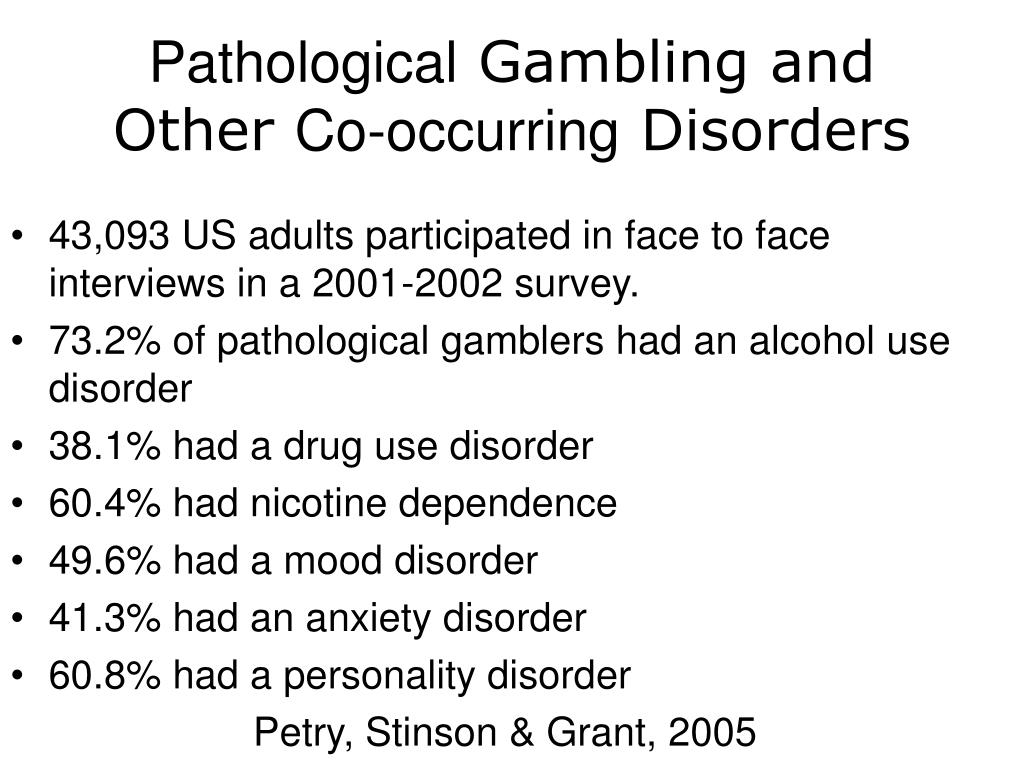-
Pathological Gambling Mental Illness

If you or a family member are in crisis, please call:. the Crisis Hotline anytime at or. the Domestic Violence help line anytime at or.
Extreme cases of problem gambling may cross over into the realm of mental disorders. Pathological gambling was recognized as a psychiatric disorder in the.
the Homeless Hotline at or. Crisis Text Line, Text 4hope to 741 741 anytime or.
Trevor Project Lifeline for LGBTQ youth anytime at or. Trans Lifeline at is available 18 hours a day. (Learn more about ) or.
Military & Veterans Crisis Line anytime at, press 1 or. Military & Veterans Crisis Text Line anytime at 838255.
Opiate Hotline at for community information, education, support and connection to services anytime, day or night. Gambling Prevention in Ohio Problem Gambling According to the National Council on Problem Gambling, the term “problem gambling” refers to the urge to gamble, despite harmful and negative consequences or a desire to stop. This definition may also include the condition known as “pathological gambling,” a progressive addiction whereby a person gambles compulsively to such an extent that the activity has a severe negative effect on his/her job, relationships, mental health and/or other important aspects of life. People who suffer from pathological gambling may continue to gamble even after they have developed social, economic, interpersonal or legal problems as a result of the gambling.
Problem gambling, like other brain diseases of addiction, is widespread. Two million (1%) of U.S. Adults are estimated to meet criteria for pathological gambling in a given year, according to the National Council on Problem Gambling. Another four to six million (2-3%) would be considered problem gamblers; that is, they do not meet the full diagnostic criteria for pathological gambling, but meet one or more of the criteria and are experiencing problems due to their gambling behavior. Based on national prevalence data, in Ohio it is estimated that 264,000 adults and approximately 38,000 adolescents exhibit problem gambling behaviors. Source: OhioMHAS, mha.ohio.gov problem Gambling warning signs Are you concerned you have been, or are currently, a problem gambler?.
Do you find yourself reliving past gambling experiences, planning the next venture or thinking of ways to get money to gamble?. Need to gamble with increasing amounts of money in order to feel the excitement?. Become restless or irritable when attempting to cut down or stop gambling?. Gamble as a way of escaping from problems or relieving guilt, anxiety or depression?. Often return another day in order to get even or chase your losses after gambling?. Lie to family members, friends, therapist or others to conceal the extent of involvement with gambling?. Participate in illegal activities (e.g., forgery, fraud or theft) in order to finance your gambling?.
Jeopardize or lose a significant relationship, job or educational or career opportunity because of gambling?. Rely on others to provide money to relieve a desperate financial situation caused by gambling?. Attempt to control, cut back or stop gambling but are unable to do so? Source: OhioMHAS, mha.ohio.gov Help is Available Early intervention and treatment services are available to residents of Stark County through a network of qualified, caring service providers.

Ohio Problem Gambling Ohio law requires Ohio Department of Mental Health and Addiction Services to promote, assist in the development of and coordinate or conduct programs for gambling addiction. The constitutional amendment that brought casinos to Ohio also includes OhioMHAS as the authority expected to address problem and pathological gambling. This amendment includes a requirement that two percent of the tax on the casinos’ gross revenue go to the State Problem Casino Gambling and Addictions Fund to support efforts to alleviate problem gambling and substance abuse and related research in Ohio. To date, OhioMHAS collaborates with the Ohio Lottery Commission, local communities, alcohol and other drug treatment providers, county ADAMHS Boards, faith-based entities and others to reduce problem gambling and to establish and improve gambling treatment and prevention services for Ohioans. With funding support from the Ohio Lottery Commission, OhioMHAS funds six problem gambling programs statewide in conjunction with alcohol and other drug addiction treatment services. The programs are in Athens, Cleveland, Cincinnati, Columbus, Toledo and Youngstown.
In addition, OhioMHAS coordinates a one-day problem gambling prevention and treatment conference each year during Problem Gambling Week in March. Ensuring that the addiction services field is ready and able to serve Ohioans with problem or pathological gambling is another role of OhioMHAS. For this reason, the Department has been providing statewide and regional trainings for addictions counselors so that Ohio has adequate staffing levels to address problem gambling behaviors as they arise. Read more about gambling prevention from and, if you gamble, learn how you can.

